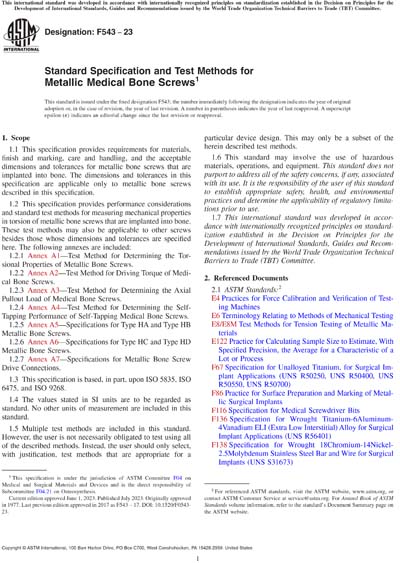Most recent
ASTM F543-23
Standard Specification and Test Methods for Metallic Medical Bone Screws
1.1 This specification provides requirements for materials, finish and marking, care and handling, and the acceptable dimensions and tolerances for metallic bone screws that are implanted into bone. The dimensions and tolerances in this specification are applicable only to metallic bone screws described in this specification.
1.2 This specification provides performance considerations and standard test methods for measuring mechanical properties in torsion of metallic bone screws that are implanted into bone. These test methods may also be applicable to other screws besides those whose dimensions and tolerances are specified here. The following annexes are included:
1.2.1 Annex A1—Test Method for Determining the Torsional Properties of Metallic Bone Screws.
1.2.2 Annex A2—Test Method for Driving Torque of Medical Bone Screws.
1.2.3 Annex A3—Test Method for Determining the Axial Pullout Load of Medical Bone Screws.
1.2.4 Annex A4—Test Method for Determining the Self-Tapping Performance of Self-Tapping Medical Bone Screws.
1.2.5 Annex A5—Specifications for Type HA and Type HB Metallic Bone Screws.
1.2.6 Annex A6—Specifications for Type HC and Type HD Metallic Bone Screws.
1.2.7 Annex A7—Specifications for Metallic Bone Screw Drive Connections.
1.3 This specification is based, in part, upon ISO 5835, ISO 6475, and ISO 9268.
1.4 The values stated in SI units are to be regarded as standard. No other units of measurement are included in this standard.
1.5 Multiple test methods are included in this standard. However, the user is not necessarily obligated to test using all of the described methods. Instead, the user should only select, with justification, test methods that are appropriate for a particular device design. This may only be a subset of the herein described test methods.
1.6 This standard may involve the use of hazardous materials, operations, and equipment. This standard does not purport to address all of the safety concerns, if any, associated with its use. It is the responsibility of the user of this standard to establish appropriate safety, health, and environmental practices and determine the applicability of regulatory limitations prior to use.
1.7 This international standard was developed in accordance with internationally recognized principles on standardization established in the Decision on Principles for the Development of International Standards, Guides and Recommendations issued by the World Trade Organization Technical Barriers to Trade (TBT) Committee.
Content Provider
ASTM International [astm]






